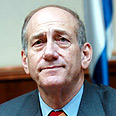
The year Israel returned to Lebanon
As the Hebrew year of 5766 draws to a close, Ynetnews looks at the year that was
5766 was a fast-paced and dramatic year for the Israeli people.
It was a year that saw the breaking apart of an old political order, and the ambitious rise to power of a new, center party, formed by Ariel Sharon. 5766 ended with a war with Hizbullah, unforeseen by most, which saw thousands of rockets land on northern Israel, and a return of IDF troops to Lebanese soil.
By the time Israel ushered in 5766, the last Israeli resident and soldier had left the Gaza Strip, under Prime Minister Ariel Sharon's disengagement plan.
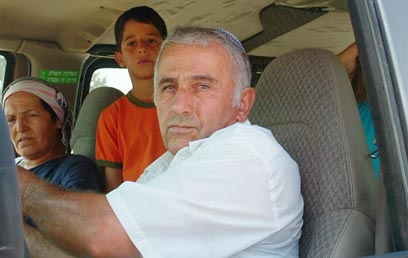
Family Leaves Gush Katif (Photo: Aya Ben Amos)
Israelis who believe in a greater Land of Israel, and in Jewish settlement from the Jordan River to the Mediterranean Sea, the orange camp, felt alienated and fractured from the rest of society, and Gaza evacuees uprooted from their homes struggled to adjust, and to build new homes within Israel.
As the country licked its internal wounds and strived to heal divisions, tensions within Likud eventually split the party, and prime minister Sharon broke away from the party he helped found.
He launched Kadima – a new, centrist movement, described by fellow party member Meir Sheetrit as having "disengaged itself from all ideologies."
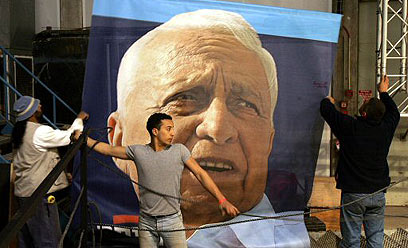
Man puts up 2005 elections poster (Photo: AFP)
Not long after launching Kadima, Sharon suffered a massive stroke, putting an unexpected end to his political life.
During his last interview before the stroke, Sharon told a Japanese reporter: “I am a Jew, and that is the most important thing for me. Therefore when it comes to security, Israel will not make any compromises." Sharon urged the Palestinians to "stop terror completely, dismantle terrorist organizations, collect weapons and implement reforms."
But the Palestinians chose to elect Hamas as their government weeks later, the Islamist organization which pioneered jihad suicide bomb attack on Israeli civilian targets. For many Israelis, the Hamas elections revolution in the West Bank and Gaza confirmed the belief that 'there is no one to talk to' on the Palestinian side, and strengthened the impetus for unilateral steps to improve Israel's situation, and that of the region.
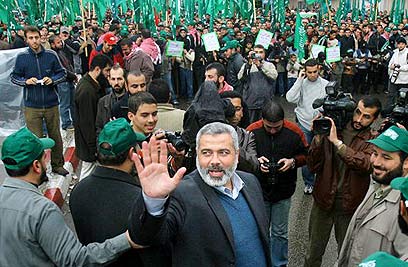
Hamas takes power in Palestinian elections
Sharon's health crisis catapulted Ehud Olmert, former mayor of Jerusalem, and a man with extensive political and Knesset experience, but no military background, into the driving seat.
With a platform offering unilateral withdrawals from areas deemed pointless and costly for Israel to remain in, Kadima and Olmert both proved to be electoral successes, and Israelis voted the new party and prime minister into power.
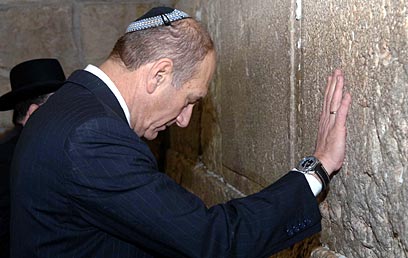
Praying for elections victory at the Western Wall: Ehud Olmert
"We suffered a serious blow, but our way is the right one and the only one that will bring security to the country," a defeated Benjamin Netanyahu said after the March elections, speaking for the Likud party.
Veteran trade union leader Amir Peretz sealed the new alliance between Labor and Kadima, after accepting the post of defense minister, despite contesting the general elections on a social equality platform.
A few short months after the new Kadima-Labor coalition took the helm, Israeli soldiers prepared to return to Gaza, following the kidnapping of an IDF soldier and the killing of two others in a Palestinian attack on the Gaza – Israel border, using tunnels and explosives.
As an anxious Israel awaited to hear news of the fate of abducted soldier Gilad Shalit, the IDF's Chief of staff Dan Halutz admitted that "the incident in Kerem Shalom caught us unprepared. This incident is a hundred times worse because this is also not the consequence we hope for in such an encounter."
Israeli tanks and soldiers returned to Gaza to retrieve the kidnapped soldier, and Operation Summer Rains was launched.
_wa.jpg)
The IDF returns to Gaza (Photo: Amir Cohen)
As the crisis with the Hamas government worsened, an unexpected blow was struck a few weeks later in the north, when Hizbullah launched a surprise attack on Israel, killing three soldiers, and kidnapping two others.
"In accordance with the obligations the Hizbullah movement has taken on… the movement managed to capture two soldiers on the border with occupied Palestine," Hizbullah declared triumphantly.
In Israel, widespread fury was felt following the abductions. Addressing the nation, Olmert said: "These are difficult days for the State of Israel and its citizens. There are elements in the north and south that threaten our stability and challenge our stamina and determination. They will fail and pay a dear price for their actions."
As Israel weighed how it would retrieve its kidnapped soldiers, a full-scale war developed, following Hizbullah Katyusha rocket attacks across the north. For the first time in its history, the northern port city of Haifa came under deadly missile attack.
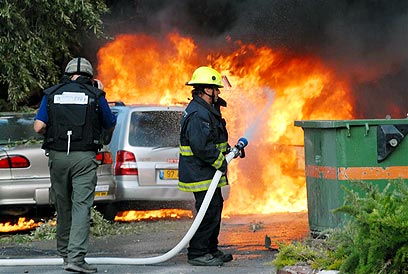
Firefighters tackle blaze after Hizbullah rocket attack on Haifa (Photo: Doron Golan)
Israel responded with massive aerial strikes against Hizbullah across Lebanon, as the Israeli public backed Olmert, demanding a firm response to Hizbullah's unprovoked cross-border attack. On the last week of the war, Israeli forces rolled back into Lebanon after a six year absence.
As 5766 draws to a close, a tense ceasefire has taken hold, and a multinational force entered southern Lebanon.
The north of Israel is beginning to recover after weeks of air raid sirens and missile attacks, and the government and senior IDF rank are both facing calls for resignations and official investigation, a call so far rejected by Prime Minister Olmert, who is facing heavy public pressure over aspects of the war.
Tens of thousands of people packed Rabin Square in central Tel Aviv to call for the return of Israel's three abudcted soldiers.
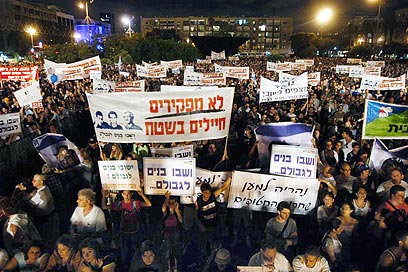
'Bring our boys home' banner held during Tel Aviv rally (Photo: Yaron Brenner)
For some, the return of a sex scandal to the headlines marked the heralding of a period of 'normalcy,' but not for President Moshe Katsav and the women who accused him of sex offences.
The increasingly embattled president, under pressure from many directions to quit his post, continues to maintain his innocence, despite the ever widening police investigation which now includes allegations of wire tapping.
5766 will be remembered for its surprising and unpredictable fast turn of events, as the Israeli people hope for a calmer and more peaceful new year, while at the same time preparing for possible future conflicts.










